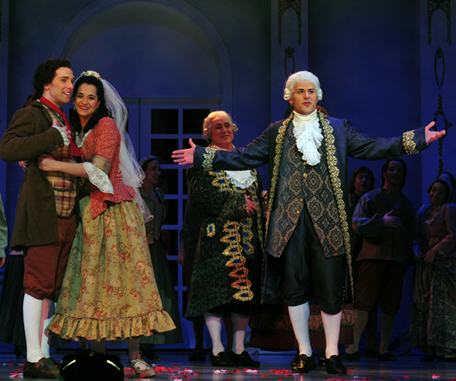
Is this your, errr, camisole?
For its third production of the 2009-10 season Opera San Jose presents the enduring favorite, Mozart’s The Marriage of Figaro, and in their light and lively production, proves once again how engaging, insightful and just plain fun the opera is.
The stage director, Peter Kozma, refrains from tinkering with the original work, retaining the late-17th-century setting and thereby allowing the central conflicts of the opera—the clash between the aristocracy’s frivolous control and the heartfelt sentiments of people they rule—to be clearly visible. All that is peppered with the roguish wiles of the commedia dell’arte bumblers, who entangle the plot, and splashed with a good deal of physical comedy.
Lingerie seems to play a major part in the first act: giving the maid Susanna something to fold while talking with the hormone-riddled page Cherubino, who then sings his anthem to post-adolescent sexual confusion, “Non so più cosa son” (“I don’t know what I am anymore”), to a corset. Everyone gets a chance to fling enticing bits of undergarments all around the stage. And the lively staging pointed out a reality of contemporary opera: that you have to be able to sing while doing anything!
Khori Dastoor, who is in her last season as a resident artist with the company, sang Susanna and was well matched with Brian Leerhuber as Figaro. Her lighter, flexible soprano made an especially good match with lyric soprano Rebecca Davis’ Countess. Their two voices blended beautifully in that bewitching duet “Sull’aria,” during which the two women plot a bait-and-switch assignation with the Count. In this caper, the Count will come away with a realization that the switch, his wife’s love, is the greater prize.
Both baritones—Leerhuber and Karassen Kargiozov, who sang Count Almaviva—had rich, resonant voices, and a real knack for comic expression, carried off with grace, so that while their characters paced through a series of ridiculous maneuverings of dubious ethics they remained sympathetic, Leerhuber catching the reality of Figaro’s position, which despite his cleverness, is that of a servant.
Mezzo Tori Grayum made an adorable Cherubino, a part she took on when Bettany Coffland, who sang the part for this cast in Opera San José’s double-casted production, suffered a back injury. Grayum has a rather sweet sound, which suited her interpretation, which is more childlike and less sexually pressed than most.
The conniving accomplices, Dr. Bartolo (Silas Elash), Marcellina (Heather McFadden) and Don Basilio (Bill Welsh), added their large, fine voices to this excellent vocal cast, allowing Mozart’s gorgeous ensemble pieces to unfold in all their melodic splendor.
Finally, it is Mozart’s supremely melodic and refined music that fuels our love of this opera. From the overture with its calculated and good-natured frenzies alternating with playful lyric phrases to Rebecca Davis’ tender rendering of “Dove sono i bei momenti” (“Where are the beautiful moments”) in her Act 3 meditation on love, the music insists on attention and walks the listener into an era of elegance to witness a wide and shifting emotional spectrum.
—Jaime Robles
Opera San José production of Mozart’s “The Marriage of Figaro” continues through February 21. For tickets and information, call 408-437-4450 or visit www.operasj.org.
Photo from left: Brian Leerhuber as Figaro, Khori Dastoor as Susanna, Silas Elash as Bartolo, and Krassen Karagiozov as Count Almaviva.
